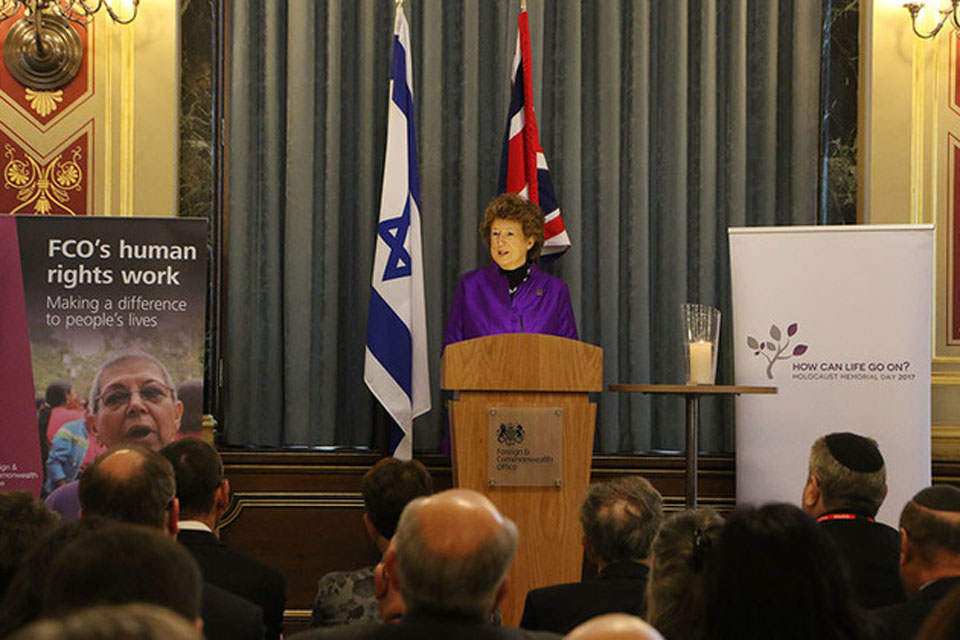Baroness Anelay speech at Holocaust Memorial Day event
Baroness Anelay welcomed guests at the Foreign Office's Holocaust Memorial Day event.

Baroness Anelay, Minister for Human Rights, said
Good morning and welcome to the Foreign and Commonwealth Office. I would like to thank those of you who have helped to organise this event today, in particular Ambassador Mark Regev and his team at the Embassy of Israel.
Importance of Holocaust Memorial Day
The Holocaust was one of the darkest periods in our history. Sometimes we would prefer to forget, because what happened is too painful to remember. But it is only by remembering that we can learn from the past and ensure that history does not repeat itself.
Continuing to raise awareness in this way is essential because intolerance and hate still afflict our societies today. Antisemitism in particular is still an issue. That is why the UK has led the international community in adopting the International Holocaust Remembrance Alliance definition of Antisemitism. We will use it to guide our work and to make clear that antisemitism has no place in our society.
How Can Life Go On?
The theme of this year’s Memorial Day is “how can life go on?” It explores the immense obstacles that must be overcome when rebuilding communities torn apart by hate. It focuses on the world’s Jewish communities after the Second World War, but it is a theme that remains highly relevant today.
Today’s event will focus in particular on antisemitism. I believe that the value of remembering the Holocaust comes when we think about the conditions that allowed such horrors to prevail. When we recall it was the existence of widespread antisemitism across Europe, that meant the Nazis’ desire to purge society of anyone who did not fit their ideal found fertile ground. When we reflect on what we might possibly have done in the same circumstances. And when we examine our own prejudices and seek to combat them, and to prompt others to do likewise.
This year’s theme reminds us that, even as the world’s Jewish communities began to rebuild their shattered lives, they continued to suffer antisemitic attacks. Shockingly, there were a number of pogroms immediately after the Holocaust, for example one in Poland where 42 Jews were murdered. Sadly, even today we cannot declare that antisemitism has been defeated. We all of us need to be vigilant in standing up against it.
That is why I am delighted that we are joined today by inspirational individuals who have dedicated their lives to raising awareness about the causes and consequences of the Holocaust.
Professor Yehuda Bauer is the author of the Stockholm Declaration and has worked tirelessly to ensure that the world remembers the Holocaust and learns lessons from it.
Dorit Oliver-Woolf survived the Holocaust and went on to enjoy a successful musical career. She has dedicated her life to educating others about the Holocaust.
We will also hear from Dr Dave Rich of the Community Security Trust, and from our Young Ambassadors from the Holocaust Educational Trust, Iqra Arshad and Toni-Ann Cover.
Conclusion
I would now like to invite Ambassador Regev to the podium, to introduce Professor Bauer. While he makes his way up, I will conclude using the words of the Stockholm Declaration:
Our commitment must be to remember the victims who perished, respect the survivors who are still with us, and reaffirm humanity’s common aspiration for mutual understanding and justice.
Thank you.